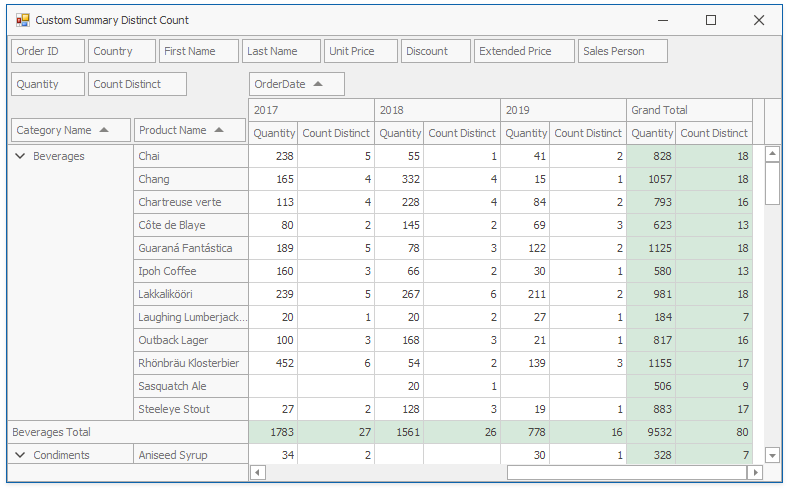PivotGridControl.CustomSummary Event
Allows you to calculate a custom summary.
Namespace: DevExpress.XtraPivotGrid
Assembly: DevExpress.XtraPivotGrid.v19.2.dll
Declaration
Event Data
The CustomSummary event's data class is PivotGridCustomSummaryEventArgs. The following properties provide information specific to this event:
| Property | Description |
|---|---|
| ColumnField | Gets the column field that corresponds to the current cell. Inherited from PivotGridCustomSummaryEventArgsBase<T>. |
| ColumnFieldValue | Gets the value of the column field that corresponds to the current cell. Inherited from PivotGridCustomSummaryEventArgsBase<T>. |
| CustomValue | Gets or sets a custom summary value. Inherited from PivotGridCustomSummaryEventArgsBase<T>. |
| DataField | Gets the data field against which the summary is calculated. Inherited from PivotGridCustomSummaryEventArgsBase<T>. |
| FieldName | Gets the name of the data field against which the summary is calculated. Inherited from PivotGridCustomSummaryEventArgsBase<T>. |
| RowField | Gets the row field that corresponds to the current cell. Inherited from PivotGridCustomSummaryEventArgsBase<T>. |
| RowFieldValue | Gets the value of the row field that corresponds to the current cell. Inherited from PivotGridCustomSummaryEventArgsBase<T>. |
| SummaryValue | Gets an object that contains the values of the predefined summaries which are calculated for the current cell. Inherited from PivotGridCustomSummaryEventArgsBase<T>. |
The event data class exposes the following methods:
| Method | Description |
|---|---|
| CreateDrillDownDataSource() | Returns data records associated with the current cell. Inherited from PivotGridCustomSummaryEventArgsBase<T>. |
Remarks
The Pivot Grid Control calculates summaries against data fields. A field’s PivotGridFieldBase.SummaryType property specifies the type of summary function. The control automatically calculates built-in summaries (see the PivotSummaryType topic for a list of the available functions. You can handle the the CustomSummary event and calculate the custom summaries manually.
To calculate a custom summary for a specific data field, set its PivotGridFieldBase.SummaryType property to PivotSummaryType.Custom. In this case, the CustomSummary event will fire for each cell that corresponds to this data field.
For instance, this event enables a custom summary to be calculated against multiple fields, particular records, etc. Use the PivotGridCustomSummaryEventArgsBase<T>.CreateDrillDownDataSource method to get a list of the records that correspond to the current cell. This list can then be traversed to calculate a summary in a custom manner. The custom summary value should be assigned to the PivotGridCustomSummaryEventArgsBase<T>.CustomValue parameter.
For each cell, the Pivot Grid Control calculates all the predefined summaries (AVERAGE, MIN, MAX, SUM, etc). The calculated values can be accessed using the PivotGridCustomSummaryEventArgsBase<T>.SummaryValue property. You can use them in custom summary calculations.
Example
This example demonstrates how to calculate a custom summary to display the distinct value count.
When the control calculates the summary value for the field whose SummaryType is PivotSummaryType.Custom, the PivotGridControl.CustomSummary event occurs. The event handler calls the e.CreateDrillDownDataSource method to retrieve the underlying data rows for the current cell, counts distinct values and returns the result to the e.CustomValue property.

Note
The complete sample project How to Create a Custom Summary Type to Display the Distinct Value Count is available in the DevExpress Examples repository.
using DevExpress.XtraEditors;
using DevExpress.XtraPivotGrid;
using System;
using System.Collections;
namespace CustomSummaryDistinctCountExample
{
public partial class Form1 : XtraForm
{
public Form1()
{
InitializeComponent();
AddCustomSummaryField();
pivotGridControl1.CustomSummary += PivotGridControl1_CustomSummary;
pivotGridControl1.BestFit();
}
private void AddCustomSummaryField()
{
pivotGridControl1.Fields.Add(new PivotGridField()
{
Area = PivotArea.DataArea,
AreaIndex = 1,
Caption = "Count Distinct ",
FieldName = "Quantity",
Name = "fieldQuantityDistinctCount",
SummaryType = DevExpress.Data.PivotGrid.PivotSummaryType.Custom
});
}
private void Form1_Load(object sender, EventArgs e)
{
excelDataSource1.FileName = "SalesPerson.xlsx";
excelDataSource1.Fill();
}
private void PivotGridControl1_CustomSummary(object sender, PivotGridCustomSummaryEventArgs e)
{
string name = e.DataField.FieldName;
IList list = e.CreateDrillDownDataSource();
Hashtable ht = new Hashtable();
for (int i = 0; i < list.Count; i++)
{
PivotDrillDownDataRow row = list[i] as PivotDrillDownDataRow;
object v = row[name];
if (v != null && v != DBNull.Value)
ht[v] = null;
}
e.CustomValue = ht.Count;
}
}
}
Related GitHub Examples
The following code snippets (auto-collected from DevExpress Examples) contain references to the CustomSummary event.
Note
The algorithm used to collect these code examples remains a work in progress. Accordingly, the links and snippets below may produce inaccurate results. If you encounter an issue with code examples below, please use the feedback form on this page to report the issue.